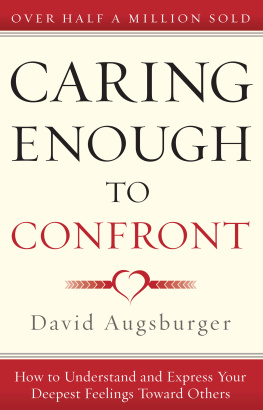CARING ENOUGH TO CONFRONT

2009 David Augsburger
Published by Revell
a division of Baker Publishing Group
P.O. Box 6287, Grand Rapids, MI 49516-6287
www.revellbooks.com
First Edition, 1973 (Herald Press)
Second Edition, 1981 (Herald Press)
Third Edition, 2009 (Regal Books)
Revell edition published 2014
ISBN 978-1-4412-2457-6
Ebook edition originally created 2011
All rights reserved. No part of this publication may be reproduced, stored in a retrieval system, or transmitted in any form or by any meansfor example, electronic, photocopy, recordingwithout the prior written permission of the publisher. The only exception is brief quotations in printed reviews.
Library of Congress Cataloging-in-Publication Data is on file at the Library of Congress, Washington, DC.
Scripture quotations are taken from the following versions:
NEB From The New English Bible . The Delegates of Oxford University Press and The Syndics of the Cambridge University Press 1961, 1970, 1989. Reprinted by permission.
PhillipsThe New Testament in Modern English , Revised Edition, J. B. Phillips, Translator. J. B. Phillips 1958, 1960, 1972. Used by permission of Macmillan Publishing Co., Inc., 866 Third Avenue, New York, NY 10022.
CONTENTS


PREFACE TO THE THIRD EDITION
How to differ with others: Confront others as you would have them confront you. How to disagree: Speak to others as you would want them to speak to you. How to offer help: Respect the others right to refuse your help as you would like to be able to refuse his or hers. All of these are forms of caring; each of these reveals and offers the secret of effective confronting that is necessary to constructive relating.
Creative living is care-fronting in conflict. These words that introduced the preface to this manuscript in the spring of 1973 are, more than a quarter-century later, even more true. The opportunity to totally rewrite, update and improve this book on conflict is a testimony that it is even more needed, more appropriate to a world of contrasts in goals and differences in relationships.
When your thrust as a personyour hopes, dreams, wants, needs, drives for meaning, significance, vitalityruns counter to my thrust, there may be conflict. To sacrifice your thrust is to be untrue to the push and pull of life, of hope, of God at work within you. To negate my own thrust is to refuse to be fully open to the presence and work of God within my life. Integrating your needs and wants with my needs and wants in our joint effort toward creating Christian community is effective living.
It is not conflict that needs to concern us, but how the conflicts are handled. The frontal impact of our coming together can be creative, strengthening and growth producing. This concern for a balanced wholeness of personal integrity and sensitivity to persons runs throughout these essays on care-fronting as a creative way of uniting care, candor and confrontation in life relationships.
The teachers, colleagues and friends who taught me to appreciate conflict and speeded my slowness to learn are many: Frank Kimper, Howard J. Clinebell, Jr., Jan and Myron Chartier, H. Newton Maloney, Speed Leas, Marcus Smucker, Alvin Dueck, Mohammed Abu Nimer, Glen Stassen, as well as hundreds of students who question, confront and keep asking their teacher to be edgy and growing.
You wrote a book called Caring Enough to Confront, a man from an audience once asked. What else have you written that doesnt work? The audience laughed appreciatively. We all can tell stories of painful failures in our conflicts and confrontations as well as hopeful moments of success when the caring is believed and the confrontation is received with the respect in which it is given, and we move toward new understanding. This is a continuation of such stories of hope.


I love you.
If I love you,
I must tell you the truth.
If I tell you the truth
Will you hear my love?
Will you hear love in my truth?
I want your love.
I want your truth.
Love me enough
to tell me the truth.
Finish, then, with lying and let each...
tell his neighbor the truth,
for we are all parts of the same body.
St. Paul, Letter to the Ephesians (4:25, Phillips)

1
CARE - FRONTING:
A Creative Way Through Conflict
Caring. Obviously a good word.
Confronting? Frequently a bad word.
Both are highly important relational words. Put together they provide the unique combination of love and truth that is necessary for building effective human relationships.
The more common practice is to keep these two distinct and separate.
There is a time for caring. There is a time for confronting.
Care when caring is called for, confront when confrontation is required.
Each in its own place, each in its own right time.
Caring dare not be contaminated by any mixture of confrontation. And confronting must not be diluted by any admixture of caring. Each weakens the other. To confront powerfully, lay care aside. To care genuinely, candor and confrontation must be forgotten, for the moment at least.
When someone matters to mereally matters, I do not dare to disagree: to differ is to disrespect; I cannot confront, because hurting another is the very last thing I want.
When Im angry, I confront. To talk of caring at a moment like that would be false. I speak the truth as I see it and let the chips fly from my shoulder to fall where they may.
A third word: Care-fronting. A good word.
Care-fronting is offering genuine caring that lifts, supports and encourages the other. (To care is to bid another to grow, to welcome, invite and support growth in another.)
Care-fronting is being upfront with important facts that can call out new awareness, insight and understanding. (To confront effectively is to offer the maximum of useful information with the minimum of threat and stress.)
Care-fronting is loving and level conversation. It unites the love one has for the other with the honest truth that I am able to see about the two of us. Care-fronting unifies concern for relationship with concerns for goalsmy goals, your goals, our goals. So one can have something to stand for (goals) as well as someone to stand with (relationship) without sacrificing one for the other or collapsing one into another. This allows each of us to be genuinely loving without giving away ones power to think, choose and act. In such honesty, one can love powerfully and be powerfully loving. These are not contradictory. They are complementary. (The opposite is to express powerless love until anger erupts in loveless powerto yield in pseudo-love until one overloads to the breaking point and then explode with demands heated to the boiling point.)
Next page















